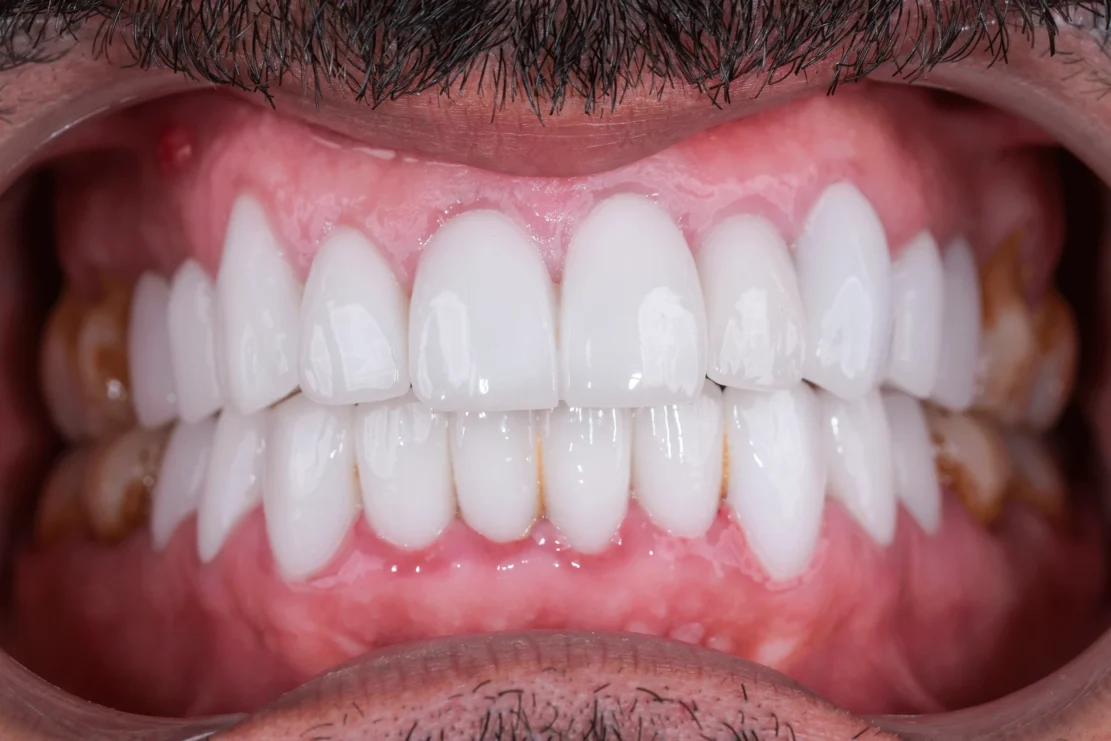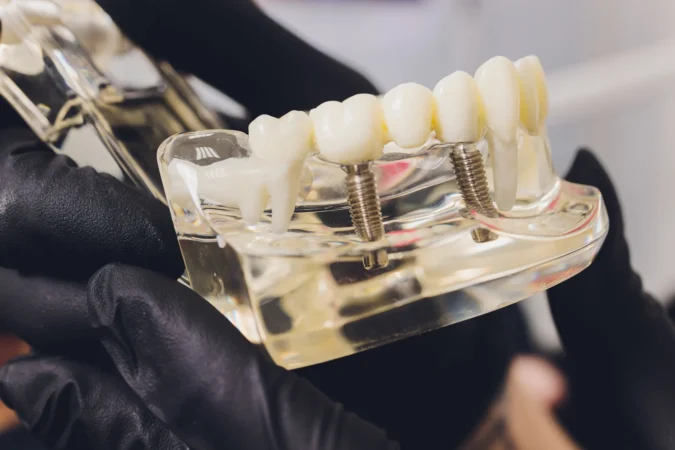Table of content
Table of content
Understanding Dental Nerve Removal and When It’s Needed
Most people never think about dental nerve removal until a tooth starts to hurt in a way that feels impossible to ignore. At first, it might just be a quick sting when you drink cold water or a sharp twinge when hot coffee touches a certain tooth. You hope it will disappear on its own.
Then the pain changes.
You find yourself chewing only on one side. You keep touching your cheek. That small sting turns into a deep, throbbing ache that wakes you at night or distracts you during the day. Painkillers and home remedies may give short, temporary relief, but the pain always seems to come back.
When it reaches this stage, it often means the tooth nerve is inflamed or infected. That is the point where dental nerve removal becomes necessary; not as something extreme, but as a targeted way to stop the pain and protect the tooth.
In modern dentistry, dental nerve removal is performed through root canal treatment. The procedure focuses on:
- removing the painful, infected nerve
- cleaning and disinfecting the inside of the tooth
- and keeping your natural tooth in place instead of removing it
So in this article, we talk about dental nerve removal as the main topic, and explain how root canal treatment in Turkey is the technique used at DentSpa to perform it safely, gently, and with long-term results.
Consult Our Experts Now!
Book an online assessment to learn if root canal treatment in Turkey is the right option for you.
What “Nerve Removal” Actually Means
The pulp functions as a tiny sensitive tissue area which resides within each tooth structure.
The tooth nerve, along with blood vessels and connective tissue, sits within this space.
The pulp functions as a growth promoter during childhood to enable tooth development.
Once you reach adulthood, the outer tooth layers maintain tooth survival since they provide the necessary life-support functions.
The pulp becomes vulnerable to bacterial invasion through three main routes:
- deep tooth cavities
- cracks in the tooth
- prolonged tooth decay
When bacteria penetrate the nerve tissue, they trigger infection and inflammation, leading to severe and persistent tooth pain.
Removing the nerve tissue does not cause tooth death.
The procedure eliminates the infected or damaged tissue while preserving the entire tooth structure.
This treatment allows you to bite normally and enjoy comfortable chewing while maintaining your natural tooth for many years.
Root canal therapy is a fundamental dental procedure in modern dentistry and offers strong long-term protection for your oral health.
Modern dental clinics use advanced technology to perform root canal treatments which deliver precise and gentle care that traditional methods cannot match. Before starting, your dentist will take X-rays to assess the extent of the problem and check for root and bone involvement.
Root Canal Procedure: Step by Step
The following steps describe the actual process of removing the nerve:
- You get fully numb
The dentist prioritizes this step. Most patients feel only pressure or movement rather than pain. - A small entry point is made
A minimal access point is created to reach the infected pulp tissue. - The infected or irritated nerve tissue is removed
Pain relief begins once the source of discomfort is removed. - The canals are disinfected
This step protects your oral health by preventing bacterial recurrence. - The canals are prepared and dried
- The canals are sealed
Biocompatible materials are used to fill and protect the roots. - A crown is added if needed
Molar teeth often require a crown for long-term strength.
Most patients leave saying:
“I never expected to fear this procedure; it turned out to be uneventful.”
Root Canal vs. Tooth Extraction: Why Saving the Tooth Is Usually Better
Patients often ask why they shouldn’t simply extract the tooth, since extraction seems easier.
While extraction appears straightforward, removing a tooth triggers a series of changes:
- An empty gap forms
- Adjacent teeth begin shifting into the space
- Your dental alignment becomes unbalanced
- Remaining teeth absorb more chewing pressure
- The jawbone in the missing-tooth area slowly deteriorates
Patients then often need dental implants or bridges to replace the tooth.
The treatments deliver outstanding results but they need extended treatment duration and cost more money and sometimes require surgical intervention.
Turkey offers superior long-term results for root canal treatment because it maintains your natural tooth structure while addressing dental problems at their beginning stages.
Am I a Candidate for Root Canal Treatment?
You may need root canal therapy if you experience any of the following:
- Intense sensitivity to hot or cold
- Deep pain that comes and goes
- Swelling around the tooth
- A pimple-like bump on the gum
- Pain when biting or tapping the tooth
- A cavity that has reached the inner tooth layers
- Pressure or visible swelling caused by an abscessed tooth
These symptoms are your body’s way of alerting you that the nerve inside your tooth is damaged. At this stage, the nerve cannot recover on its own.
However, you may not be eligible for a root canal treatment if you experience any of the following:
- The tooth structure below the root has broken down completely
- The remaining tooth cannot support a crown
- Surrounding bone tissue shows extensive damage
- The tooth cannot be restored to proper function
In these cases, your dentist may recommend extraction followed by dental implants or a bridge.
What to Expect After the Treatment
Many people assume the recovery will be painful, but once the infected nerve is removed, the deep tooth pain usually fades quickly.
These symptoms usually disappear within three days.
Your dentist will encourage you to:
- Brush gently as you maintain oral hygiene
- Continue your normal dental care routine
- Eat soft foods for a short time
- Take prescribed medication as instructed
Once healed, the treated tooth feels completely normal, most patients forget which tooth received the treatment.
Schedule Your Visit!
Our team can support you from your online consultation until your visit to Turkey.
Root Canal Treatment Costs: Turkey vs. Other Countries
The expense of root canal procedures between Turkey and other nations forms the basis of this comparison.
People researching root canal treatment in Turkey often focus on costs, as dental procedures in their home countries can be more expensive.
Typical cost ranges:
- United States: The price range for dental implants in the United States falls between $600 and $1600 for each tooth.
- United Kingdom (private care): £300–£900
- Western Europe: €200–€1600
Turkey’s lower operating costs allow clinics to offer care at significantly reduced prices.
Even when adding travel and accommodation, many patients save 50%–70% compared to clinics in the US, UK, and Western Europe.
Why Turkey Has Become a Leading Dental Tourism Hub
Patients from Europe, the Middle East, the US, and Australia travel to Turkey because:
- Clinics use modern medical equipment and highly skilled dental teams
- Waiting times are short; treatment can begin within days
- Clinics offer hotel and transportation assistance
- Treatment plans are shared online before traveling
- Patients can enjoy Turkey’s holiday destinations during their stay
- The country provides safe, affordable dental care
Why Choose DentSpa for Your Root Canal Treatment
Turkey has many dental clinics, but DentSpa stands out for its combination of expertise, technology, and patient care.
DentSpa offers:
- PhD-level specialist doctors
- Professors and associate professors planning and performing treatments
- High-quality materials and advanced dental technology
- Clear cost and treatment explanations before your trip
- Gentle clinical techniques and supportive staff
- Complete A–Z care and aftercare
DentSpa merges European-level dentistry with accessible pricing, making it a trusted clinic for international patients.
We Stand Ready to Help You Through Your Recovery Journey.
A toothache becomes unbearable when left untreated and may lead to the loss of natural teeth.
A root canal procedure serves two main purposes by removing pain and preventing future tooth infections.
Turkey provides dental services of superior quality at rates which are significantly cheaper than what other nations charge.
If you need dental nerve removal or want a second opinion, contact DentSpa. Our team provides full support to patients throughout their entire treatment journey from their initial online consultation through to the end of their treatment.
Book your first free consultation now, and get the chance to add your smile to our Smile Gallery.
Visit: Dentspa.com
Before & After
Frequently asked questions
How long does a root-canal-treated tooth last?
With proper dental care and a well-fitted crown, a root-canal-treated tooth can last for many years. Regular dental check-ups together with good oral hygiene practices and protective measures against tooth damage from excessive force will help keep teeth strong.
Can a root canal treat an abscessed tooth?
Often, yes. Root canal therapy is a primary treatment for an abscessed tooth because it removes the infection from inside the tooth and allows the surrounding area to heal. In more severe cases, your dentist may add other steps, but the root canal is usually the core of the treatment plan.
Is it worth saving the tooth?
Yes, saving your natural tooth is usually the best option. A root canal procedure protects your jawbone structure while maintaining your bite alignment and preventing the requirement for dental implants or bridges. As long as the tooth can be restored, preserving it offers strong long-term benefits for your oral health.
How long does a root canal take?
Most root canal treatments take about 45 to 90 minutes. The length of treatment depends on the treated tooth and the number of canals it has. More complex cases or heavily infected teeth may need a second visit to complete the procedure properly.
Will removing the nerve end my tooth pain?
The answer is affirmative for the most part. Once the infected or damaged nerve tissue is removed during root canal therapy, the main source of the toothache is gone. The treatment area will have temporary light soreness but deep throbbing pain will resolve itself within a short period.



















 70%
70% 

